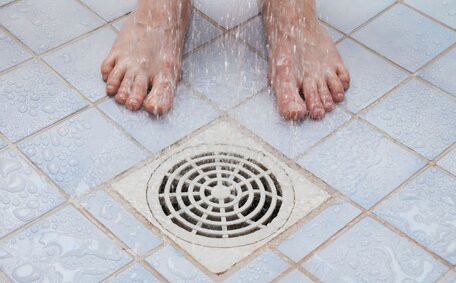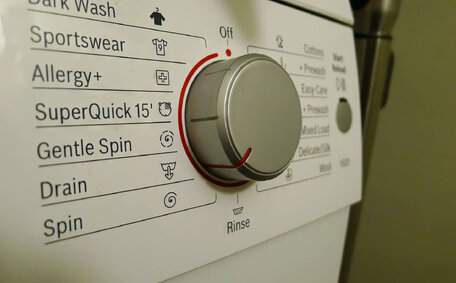
Baking Soda & Vinegar for Cleaning
Using baking soda & vinegar separately for cleaning is very effective; but mixing them dilutes their cleaning power. Learn how to use them properly.
Read MoreUnpleasant drain odours often indicate underlying plumbing problems in homes and businesses. The unpleasant odours are often a sign that something is not quite right with your plumbing system.
In Lilyfield, Sydney, common culprits of drain odours include:
If you detect foul odours from drains in your Lilyfield property, investigating and resolving the root cause is crucial. Left unchecked, the need to clean smelly drain odours can signify serious plumbing issues that may lead to blocked drains, sewage backups and potential health hazards. We highly recommend you call a plumber based in Lilyfield to address the smell coming from your drains for diagnosis and repair.
One of the most common causes of smelly drains is a buildup of organic matter finding its way into your pipes over time.
Food scraps, fats oils, hair and other debris can accumulate in drains and begin to rot, releasing foul odours.
As too much buildup of organic matter begins to accumulate, it provides food for bacteria growth and decay.
The bacteria digest waste such as hair soap scum which results in a release of smelly sewer gas, notably hydrogen sulphide, that carries the infamous rotten eggs odour.
Hence, regular maintenance is essential to prevent this organic buildup. Even with regular maintenance, drains may need attention every three to six months.
Simple habits like scraping food scraps into the bin rather than the kitchen sink, which can lead to buildup organic material in your pipes, using drain covers and strainers, and pouring used cooking oil into a container to dispose of can help. To tackle sink drain issues, you might wonder 'what can I do?' - a professional plumber can use high-pressure water jets, augers and specialised tools to clear away stuck-on grease, ensuring your drain can maintain a free flow, removing odour sources.
Grease and food scraps often lead to smelly sinks in both kitchens and bathrooms. Substances such as grease, cooking oils, and sauces, once washed down the sink, can form sticky, smelly residues inside the pipes. Over time, this greasy residue accumulates and begins to decay, prompting the question 'does my kitchen sink have a buildup?', as it results in creating foul odours which can become quite overpowering.
Food waste from garbage disposals can increase greasy residue in sink drains. While the disposal may grind scraps into finer particles, they can adhere to pipe walls during washing. Eventually, the grease, oils and food debris combine into a thick, smelly and sluggish mass.
To prevent rancid buildup in all your drains, refrain from pouring grease or oils down the drain after cooking. First, let grease solidify and dispose of it into the trash rather than pouring it down into your plumbing. Get rid smelly causes by composting vegetable/fruit scraps instead.
Use sink shower strainers to catch food scraps and other debris when washing, and avoid putting large amounts of food waste in the disposal.
Despite good practices, regular cleaning with methods like boiling water pour-downs is vital to combat grease and food buildup. Employing a routine cleaning regimen every 3-4 months is key to prevent a smelly sink drain, using vinegar baking soda solutions or commercial cleaners to eradicate grease build-up. A professional hydro jetting service can deeply cleanse pipes by blasting away years of accumulated gunk, thus addressing persistent sink drain smells.
Hair and soap scum accumulation can be another culprit behind smelly drains in Lilyfield homes and businesses. Strands of hair and soapy residue that builds up over time in floor drains can lead to a call for plumbing services to clear the sides of your pipes. As this residue catches more debris passing through, it gradually amasses into a thick layer coating the pipes.
Hair, soap scum, and drain flies provide the ideal moist, nutrient-rich environment for mould and bacteria growth. When microbes feed on organic matter and release unpleasant sulphide gases into your home, it’s probably time to call a plumber. As the globs of hair, soap and grime get larger, they also cause blockages that prevent wastewater from draining freely.
Drain strainers and catchers are simple tools to prevent hair and soap scum from entering shower and bathroom drains. Strainers trap larger debris, and catchers line drains, ensuring water flows through without carrying substantial residue, which can be vital if you detect odours. It’s also wise to wipe soap buildup off tiles and surfaces near drains to prevent it from coming out in the water flow and going down the drain.
However, strainers and catchers are not foolproof. Over time, some residue will inevitably find its way into the pipes. To prevent unwanted smells, it is recommended to clean drains thoroughly every 3-4 months.
A professional hydro jetting service can power through tough clogs caused by hair, soap and grime accumulation in Lilyfield homes and businesses.
P-traps, or sewer gas traps, are the U-shaped water trap pipes underneath sinks, baths, and any other drain. These water traps play an important role in plumbing systems by creating a water seal that prevents sewer gases from entering the home. However, p-traps can sometimes be the common causes of smelly drains if not working properly.
One common issue is a dry p-trap.
Regularly running water through drains is crucial to maintaining the p-trap’s water seal and preventing odour issues.
A faulty, leaking, or improperly installed p-trap can also fail as a sewer gas trap and cause bad smells. Even the smallest cracks can allow gases to leak through, so homeowners can get ahead of the issue by inspecting joints routinely. Replacing a damaged p-trap or reconfiguring one installed incorrectly can resolve smells stemming from this issue.
A p-trap may simply become clogged with the same buildup that causes a foul odour - hair, soap scum, grease and other debris elsewhere in the plumbing system. Regular cleaning and maintenance in your kitchen clears out stuck-on gunk and bacteria, while a professional plumber can ensure your p-traps are properly installed and functioning.
Bacteria accumulating in the stagnant water of p-traps can also generate foul smells.
Blocked sewer lines prevent waste from freely reaching the sewer main, potentially causing backups and unpleasant odours.
Vents are pipes that allow gases to safely escape from the sewer system. If vents get clogged, gases can be forced back up through drains, causing foul odours. Clogged vents and sewer lines can also cause foul drain smells in homes and businesses.
Signs of a venting or sewer issue include gurgling sounds from drains despite no use, slow draining, and the notorious sewer smell. The problem, or root cause, may originate on your property, evidenced by how smells can often be traced to clogged vent pipes or entangled tree roots.
But it can also stem from blockages and breaks in your sewer lines under the street.
A professional plumber should inspect your drains and sewer connections for a definitive diagnosis.
They can check vents for obstructions, use cameras to see inside pipes, and determine if the main line needs attention. Repairing or unblocking vents and sewer lines will resolve smells by allowing wastewater and gases to flow freely again.
When drains aren’t properly cleaned and maintained, bacteria and mould can flourish, leading to the smell coming your way from within the pipes. These microorganisms proliferate in the dark, moist environments inside drain lines, leading to odours emanating from the pipes. Fatty oils, food particles, and other organic residues serve as nutrients for bacteria and mould, promoting rapid colony growth.
As bacteria feed and spread, they produce smelly metabolic waste products like hydrogen sulphide, which contribute to drains smell akin to rotten eggs. Mould is also known to release distinctly unpleasant odours. The gases from bacteria and spores from mould can easily make their way up drain pipes and into living spaces, with the smell coming from your drain causing unpleasant odours.
Pouring boiling water down from hot water systems into drain sinks and tubs helps kill bacteria and mould while melting away fatty residues. For a simple weekly treatment, flush drains with a mixture of baking soda and white vinegar to clean pipes and control microbial growth coming out your fixtures.
If odours persist despite preventive measures, do not hesitate to call professional Lilyfield plumbing services. They can perform a deep cleaning using high-pressure hydro jetting to scrub pipes and rid smelly drains of the thriving bacteria and mould accumulation.
Identifying the source of sink odours may require investigative steps, but you can narrow down the likely causes by examining specific areas methodically.
Start by determining whether the odour is isolated to one drain or is a widespread issue. A persistent sink drain smell, even when not in use, suggests that the issue originates from within the drain infrastructure. However, if all drains emit an odour, it may indicate a more extensive problem affecting the entire drainage system.
To remedy an odorous fixture like your sink drain, Start by inspecting the drain trap and P-trap underneath. Make sure they are clear of debris, properly connected and have water in them to form a seal. Also check for leaks around joints.
Drain odours often originate in the kitchen from accumulation of food waste in the garbage disposal and pipes. Remove and clean sink drain screens and use a auger in the disposal to remove stuck debris.
If multiple drains are smelly, the problem may be farther down the main sewer branch pipes. A blockage would cause sewer gases to back up. Run a drain snake, use a shop vac to clear pipe obstructions, or call a professional plumber if needed.
By taking a strategic approach, you can pinpoint whether your bathroom sink trap system or a larger blockage is the source of any unpleasant drain smells.
There are several easy things homeowners can do to help prevent smelly drains:
Simple habitual changes and regular maintenance can prevent odours and buildup in sink drains. Contact a professional plumber for drain cleaning if odours persist despite preventive efforts.
If you’re already dealing with smelly drains, there are several methods to tackle the unpleasant odours.
For a simple homemade solution to care for kitchen sinks, pour one cup of baking soda down the drain followed by one cup of vinegar. Allow the mixture to fizz and work for 5-10 minutes, then rinse with hot water. The combination of half cup acidic vinegar and half cup alkaline baking soda breaks up gunk and sanitises pipes.
Enzyme-based drain cleaners are also effective against odours. Look for products containing bacteria cultures that digest buildup. Simply pour or spray down your drains as directed, allowing bacteria time to work.
For tougher odours, try a home remedy such as a cup baking soda followed by white vinegar to dissolve organic matter and eliminate smells in your drain. Caustic soda or sodium hydroxide solutions are very effective but handle with care.
Snaking drains with an auger or plunger can also help dislodge built-up debris causing smells. Finish by flushing with hot, soapy water to rinse away dislodged gunk.
Contact a professional plumber if DIY methods don’t solve persistent drain odours, as they have specialised equipment to thoroughly clean pipes and traps.
Despite diligent efforts, smelly drains can persist, becoming a nuisance. At that point, its best to call in a professional plumber for assistance.
Signs indicating it might be time to fix smelly drains with professional assistance include:
A very professional plumber such as Lilyfield Plumbing possesses the specialised equipment and expertise to meticulously inspect your drains, pinpoint problems and execute repairs. We can use high-pressure hydro jetting to blast away years of built-up grime that DIY methods may miss.
Our team, your local experts, extends their expertise to provide prompt, effective solutions for homes and businesses grappling with drain odours across the Gold Coast and Lilyfield, Sydney. Please don’t hesitate to email or call Lilyfield Plumbing for professional drain cleaning and odour elimination.
Using baking soda & vinegar separately for cleaning is very effective; but mixing them dilutes their cleaning power. Learn how to use them properly.
Read MoreBlocked drains are usually caused by buildup of hair, grease, debris and more in your pipes. Fix the problem with professional drain unblocking services to get your drains flowing freely again. Contact us for affordable drain unblocking.
Read MoreWhen you suspect a gas leak or damaged gas line, contact a licensed gas fitter immediately to locate and repair it. A gas line repair involves sealing leaks, replacing corroded or damaged pipes and testing all connections for safety before restoring gas supply.
Read MoreLilyfield, 2040 NSW
We will call back as soon as possible.




